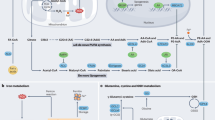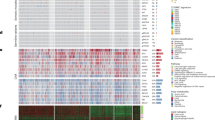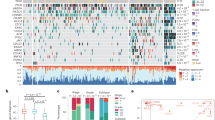Abstract
Dysregulated androgen receptor (AR) plays a crucial role in prostate cancer (PCa) development, though further factors involved in its regulation remain to be identified. Recently, paradoxical results were reported on the implication of the MEN1 gene in PCa. To dissect its role in prostate luminal cells, we generated a mouse model with inducible Men1 disruption in Nkx3.1-deficient mice in which mouse prostatic intraepithelial neoplasia (mPIN) occur. Prostate glands from mutant and control mice were analyzed pathologically and molecularly; cellular and molecular analyses were carried out in PCa cell lines after MEN1 knockdown (KD) by siRNA. Double-mutant mice developed accelerated mPIN and later displayed microinvasive adenocarcinoma. Markedly, early-stage lesions exhibited a decreased expression of AR and its target genes, accompanied by reduced CK18 and E-cadherin expression, suggesting a shift from a luminal to a dedifferentiated epithelial phenotype. Intriguingly, over 60% of menin-deficient cells expressed CD44 at a later stage. Furthermore, MEN1 KD led to the increase in CD44 expression in PC3 cells re-expressing AR. Menin bound to the proximal AR promoter and regulated AR transcription via the H3K4me3 histone mark. Interestingly, the cell proliferation of AR-dependent cells (LNCaP, 22Rv1, and VCaP), but not of AR-independent cells (DU145, PC3), responded strongly to MEN1 silencing. Finally, menin expression was found reduced in some human PCa. These findings highlight the regulation of the AR promoter by menin and the crosstalk between menin and the AR pathway. Our data could be useful for better understanding the increasingly reported AR-negative/NE-negative subtype of PCa and the mechanisms underlying its development.
This is a preview of subscription content, access via your institution
Access options
Subscribe to this journal
Receive 50 print issues and online access
$259.00 per year
only $5.18 per issue
Buy this article
- Purchase on Springer Link
- Instant access to full article PDF
Prices may be subject to local taxes which are calculated during checkout




Similar content being viewed by others
References
Siegel R, Miller K, Jemal A. Cancer statistics, 2015. CA Cancer J Clin. 2015;65:5–29.
Bluemn EG, Coleman IM, Lucas JM, Coleman RT, Hernandez-Lopez S, Tharakan R, et al. Androgen receptor pathway-independent prostate cancer is sustained through FGF signaling. Cancer Cell. 2017;32:474–89.
Li Q, Deng Q, Chao HP, Liu X, Lu Y, Lin K, et al. Linking prostate cancer cell AR heterogeneity to distinct castration and enzalutamide responses. Nat Commun. 2018;9:3600.
Abida W, Cyrta J, Heller G, Prandi D, Armenia J, Coleman I, et al. Genomic correlates of clinical outcome in advanced prostate cancer. PNAS. 2019;116:11428–36.
Grasso CS, Wu YM, Robinson DR, Cao X, Dhanasekaran SM, Khan AP, et al. The mutational landscape of lethal castration-resistant prostate cancer. Nature. 2012;487:239–43.
Shilatifard A. The COMPASS family of histone H3K4 methylases: mechanisms of regulation in development and disease pathogenesis. Annu Rev Biochem. 2012;81:65–95.
Robinson D, Van Allen EM, Wu YM, Schultz N, Lonigro RJ, Mosquera JM, et al. Integrative clinical genomics of advanced prostate cancer. Cell. 2015;162:454.
Yokoyama A, Wang Z, Wysocka J, Sanyal M, Aufiero DJ, Kitabayashi I, et al. Leukemia proto-oncoprotein MLL forms a SET1-like histone methyltransferase complex with menin to regulate Hox gene expression. Mol Cell Biol. 2004;24:5639–49.
Thiel AT, Huang J, Lei M, Hua X. Menin as a hub controlling mixed lineage leukemia. Bioessays. 2012;34:771–80.
Dreijerink KM, Goudet P, Burgess JR, Valk GD, International Breast Cancer in MEN1 Study Group. Breast-cancer predisposition in multiple endocrine neoplasia type 1. N Engl J Med. 2014;371:583–4.
Seigne C, Auret M, Treilleux I, Bonnavion R, Assade F, Carreira C, et al. High incidence of mammary intraepithelial neoplasia development in Men1-disrupted murine mammary glands. J Pathol. 2013;229:546–58.
Malik R, Khan AP, Asangani IA, Cieślik M, Prensner JR, Wang X, et al. Targeting the MLL complex in castration-resistant prostate cancer. Nat Med. 2015;21:344–52.
Dreijerink KMA, Groner AC, Vos ESM, Font-Tello A, Gu L, Chi D, et al. Enhancer-mediated oncogenic function of the menin tumor suppressor in breast cancer. Cell Rep. 2017;18:2359–72.
Bertolino P, Tong WM, Herrera PL, Casse H, Zhang CX, Wang ZQ. Pancreatic beta-cell-specific ablation of the multiple endocrine neoplasia type 1 (MEN1) gene causes full penetrance of insulinoma development in mice. Cancer Res. 2003;63:4836–41.
Floc’h N, Kinkade CW, Kobayashi T, Aytes A, Lefebvre C, Mitrofanova A, et al. Dual targeting of the Akt/mTOR signaling pathway inhibits castration-resistant prostate cancer in a genetically engineered mouse model. Cancer Res. 2012;72:4483–93.
Wang X, Kruithof-de Julio M, Economides KD, Walker D, Yu H, Halili MV, et al. A luminal epithelial stem cell that is a cell of origin for prostate cancer. Nature. 2009;461:495–500.
Qin J, Liu X, Laffin B, Chen X, Choy G, Jeter CR, et al. The PSA(-/lo) prostate cancer cell population harbors self-renewing long-term tumor-propagating cells that resist castration. Cell Stem Cell. 2012;10:556–69.
Rybak AP, Bristow RG, Kapoor A. Prostate cancer stem cells: deciphering the origins and pathways involved in prostate tumorigenesis and aggression. Oncotarget. 2015;6:1900–19.
Srinivasan D, Senbanjo L, Majumdar S, Franklin RB, Chellaiah MA. Androgen receptor expression reduces stemness characteristics of prostate cancer cells (PC3) by repression of CD44 and SOX2. J Cell Biochem. 2019;120:2413–28.
Liu X, Chen X, Rycaj K, Chao HP, Deng Q, Jeter C, et al. Systematic dissection of phenotypic, functional, and tumorigenic heterogeneity of human prostate cancer cells. Oncotarget. 2015;6:23959–86.
Beltran H, Prandi D, Mosquera JM, Benelli M, Puca L, Cyrta J, et al. Divergent clonal evolution of castration-resistant neuroendocrine prostate cancer. Nat Med. 2016;22:298–305.
Watson PA, Arora VK, Sawyers CL. Emerging mechanisms of resistance to androgen receptor inhibitors in prostate cancer. Nat Rev Cancer. 2015;15:701–11.
Paris PL, Sridharan S, Hittelman AB, Kobayashi Y, Perner S, Huang G, et al. An oncogenic role for the multiple endocrine neoplasia type 1 gene in prostate cancer. Prostate Cancer Prostatic Dis. 2009;12:184–91.
Patrawala L, Calhoun T, Schneider-Broussard R, Li H, Bhatia B, Tang S, et al. Highly purified CD44+ prostate cancer cells from xenograft human tumors are enriched in tumorigenic and metastatic progenitor cells. Oncogene. 2006;25:1696–708.
Altintas DM, Vlaeminck V, Angelov D, Dimitrov S, Samarut J. Cell cycle regulated expression of NCoR might control cyclic expression of androgen responsive genes in an immortalized prostate cell line. Mol Cell Endocrinol. 2011;332:149–62.
Acknowledgements
The authors are grateful to Emilie Servoz for the maintenance and dissection of the mouse colonies, and Dr. Brigitte Manship for her assistance in editing and proofreading the manuscript. The authors would also like to thank VV-G for providing the prostate cell lines.
Funding
This study was supported by Epigenetics & Cancer Program (ASC14092CSA), the Fondation de l’Association pour la Recherche contre le Cancer (SFI20101201530), the Ligue Inter-régionale contre le Cancer (R19040CC), the Association Le Cancer du Sein Parlons-en, and the Région Auvergne, Rhône-Alpes, (SICORRA22425). RT and RB were the recipients of a PhD fellowship from French Ministry of Higher Education and Research, and of a 4th year doctoral fellowship from Société Française d’Endocrinologie and the Fondation ARC, France, respectively. YL was the recipient of a PhD fellowship from China Scholarship Council. RAZ was the recipient of a PhD fellowship from Association “G04MEDIA S.A.R.L,” Lebanon.
Author information
Authors and Affiliations
Contributions
RT and YL conducted the experiments, analyzed and interpreted the data, and prepared figures and manuscript; MD-P, VF, and FV supervised the development of the tissue banks, and performed pathological analyses and data interpretation; VV-G, RAZ and RB provided technical and material support and participated in data interpretation; NG and IG provided material and methodological support and participated in data interpretation; PB and MLR participated in study design and provided critical revision of the manuscript; and CXZ conceived and supervised the study and manuscript preparation and obtained funding.
Corresponding author
Ethics declarations
Conflict of interest
The authors declare that they have no conflict of interest.
Ethical approval
The specimens of patients with PCa were conducted according to French laws and regulations. All animal experiments were performed in accordance with the animal care guidelines of the European Union and were validated by the local Animal Ethic Evaluation Committee (CECCAPP: C2EA-15 agreed by the French Ministry of High School and Research, Autorisation de projet CLB-2012-053).
Additional information
Publisher’s note Springer Nature remains neutral with regard to jurisdictional claims in published maps and institutional affiliations.
Rights and permissions
About this article
Cite this article
Teinturier, R., Luo, Y., Decaussin-Petrucci, M. et al. Men1 disruption in Nkx3.1-deficient mice results in ARlow/CD44+ microinvasive carcinoma development with the dysregulated AR pathway. Oncogene 40, 1118–1127 (2021). https://doi.org/10.1038/s41388-020-01589-1
Received:
Revised:
Accepted:
Published:
Issue Date:
DOI: https://doi.org/10.1038/s41388-020-01589-1
This article is cited by
-
MEN1 silencing aggravates tumorigenic potential of AR-independent prostate cancer cells through nuclear translocation and activation of JunD and β-catenin
Journal of Experimental & Clinical Cancer Research (2021)



